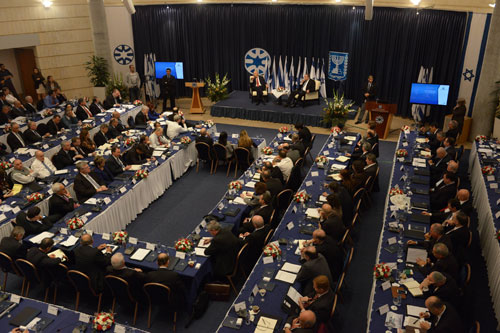President Shimon Peres and
Foreign Minister Avigdor Liberman, this morning (Sunday, 5 January 2014) officially opened the conference for Israeli ambassadors and heads of mission
at the Foreign Ministry in Jerusalem.
Before speaking to Israel's representatives across the world President Peres surveyed the MFA Situation Room which was opened during his tenure as Foreign Minister and laid a wreath at the memorial wall for
MFA employees who fell in the service of their country.
Foreign Minister Liberman, in the name of the Foreign Ministry, awarded President Peres with a special gift in acknowledgement of his diplomatic service on behalf of the State of Israel, and said: "We are at opposite poles, but both want the same thing. Even with all the doubts I have over the true intention of the other side, dialogue between us is important,” Liberman said.
Foreign Minister Liberman, addressing the conference attendees, emphasized seven major issues on Israel's diplomatic agenda today:
- relations with the U.S.;
- new areas of focus for Israel's foreign relations, with an emphasis on Africa;
- the Iranian threat;
- the Palestinian issue;
- relations with our neighbors - from Turkey and Iraq, to Libya and Sudan;
- relations with the BRICS emerging national economies: Brazil, Russia, India, China and South Africa; and
- relations with the European Union, particularly France and Germany.
President Peres addressed the negotiations with the Palestinians and said, "Since the creation of the State of Israel we have always faced more threats than opportunities, today for the first time the tables have turned and the opportunities are more tangible and promising than the dangers.
This is the first time Israel is getting offers to upgrade the relationship with the European Union and the Arab League, who for the first time is willing to recognize Israel and understands that Israel is not the enemy. Don't be confused, an economic boycott can be as damaging to Israel as the security threats.
I was here when the state was founded, Ben Gurion faced fateful decisions which had great dangers and only small chances for success. Today Israel has great opportunities. The State of Israel cannot stand on security alone, Israel needs diplomacy as well and it is the role of the Ministry of Foreign Affairs to push forward a peace agreement."
President Peres also addressed the Iranian nuclear threat and said, "I am concerned by Iran's development of long range missiles. We must monitor the development of missiles in Iran and include that in an agreement – it requires cooperation between the US and Russia. It is hard to monitor uranium but much easier to monitor the means of delivery. Iran continues to supply arms to terrorist organizations and serves as a world center of terror."
 Heads of Missions conference at the Foreign Ministry in Jerusalem Copyright: GPO/Mark Neiman
Heads of Missions conference at the Foreign Ministry in Jerusalem Copyright: GPO/Mark Neiman